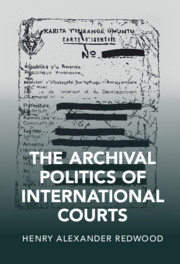Book contents
- The Archival Politics of International Courts
- Cambridge Studies in Law and Society
- The Archival Politics of International Courts
- Copyright page
- Contents
- Acknowledgements
- Abbreviations
- Chapter One The Politics of Archival Knowledge in International Courts
- Chapter Two The International Criminal Tribunal for Rwanda and Its Archive
- Chapter Three The Force of Law
- Chapter Four Contesting the Archive
- Chapter five Reconstituting Justice
- Chapter Six Imagining Community
- Chapter Seven The Residual Mechanism and the Archive
- Conclusion: The ICTR’s Archive
- Bibliography
- Index
- Cambridge Studies in Law and Society
Chapter five - Reconstituting Justice
Published online by Cambridge University Press: 13 August 2021
- The Archival Politics of International Courts
- Cambridge Studies in Law and Society
- The Archival Politics of International Courts
- Copyright page
- Contents
- Acknowledgements
- Abbreviations
- Chapter One The Politics of Archival Knowledge in International Courts
- Chapter Two The International Criminal Tribunal for Rwanda and Its Archive
- Chapter Three The Force of Law
- Chapter Four Contesting the Archive
- Chapter five Reconstituting Justice
- Chapter Six Imagining Community
- Chapter Seven The Residual Mechanism and the Archive
- Conclusion: The ICTR’s Archive
- Bibliography
- Index
- Cambridge Studies in Law and Society
Summary
This chapter looks at how other ICTR actors influenced the way in which the archive was contested. It begins by returning to the themes set out at the end of Chapter 2 and explores how the legal actors of the court initially pursued an expansive approach to the trials in search of truth, justice and reconciliation. However, this approach to prosecutions changed over time as the tribunal began to focus simply on getting as many verdicts as possible, as quickly as possible. As such, the conception of justice underpinning the archive became far more restricted and more closely resembled a more traditional form of retributive justice. This, then, shows the fragmenting of the tribunal’s initial purpose. This chapter identifies three main factors behind this shift: the solidification of the legal rules that underpinned the trials; the relationship between the tribunal and other UN organs – and particularly the Security Council’s decision in early 2000s that the tribunal had to close down as quickly as possible; and the ICTR’s acquiescence to the RPF’s demands that the tribunal halt investigations into RPF crimes during the genocide.
Keywords
- Type
- Chapter
- Information
- The Archival Politics of International Courts , pp. 109 - 136Publisher: Cambridge University PressPrint publication year: 2021

